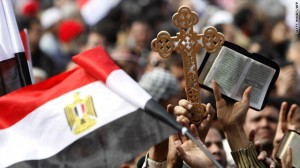Egypt: Christians are as Hopeful as They are Anxious
 “The Islamists are taking revenge on us Christians!” These words were the commentary of Coptic-Catholic Bishop of Assiut, Kyrillos William Samaan, with regard to the latest Islamist attacks on Christians and Christian institutions in Egypt while in conversation on Monday (August 12) with the international Catholic pastoral charity “Aid to the Church in Need” (ACN).
“The Islamists are taking revenge on us Christians!” These words were the commentary of Coptic-Catholic Bishop of Assiut, Kyrillos William Samaan, with regard to the latest Islamist attacks on Christians and Christian institutions in Egypt while in conversation on Monday (August 12) with the international Catholic pastoral charity “Aid to the Church in Need” (ACN).
The Bishop was referring among other things to events in the towns of Sohag, Fayum and Beni Suef and on the Sinai Peninsula. There, churches were attacked by Islamists, Christians threatened and in some cases resulting in fatalities. In the town of Sohag it was said that Islamic extremists raised the black Al-Qaida flag over a church. Al-Qaida leader Ayman al-Zawahiri had accused Egypt’s Christians of being jointly responsible with the military and the forces of the Mubarak regime for toppling the Islamist head of state Mohamed Mursi on July 3 of this year. “This is absurd, of course. 33 million Egyptians had demanded his resignation. We Christians were not the only ones to demonstrate against Mursi,” Bishop Kyrillos said. In view of the current security situation he was worried, but he did not wish to reproach law enforcement. “The police and the other organs of the state are at present busy keeping the Islamists under control.”
The Bishop stressed, however, that the climate had changed considerably for Egypt’s Christians since the fall of Mursi. “We feel at home again in Egypt,” Kyrillos explained. He went on to emphasize that non-Christian publicists would now speak up for Christians by stressing that Christians should not be expected to pay the price of democratization.
Optimism for the future constitution
The Bishop also saw it as a positive sign that in Sohag or Assiut, for example, moderate Muslims had defended Christian churches against demonstrating Islamists. “This is the true Egypt: Christians and Muslims are united,” Bishop Kyrillos continued. According to him, this year’s message from Pope Francis at the end of the Islamic fast of Ramadan was received very positively. For the first time the Pope had used the opportunity to address Muslims worldwide personally. In previous years the letter had been published by the Pontifical Council for Interreligious Dialogue on the Pope’s behalf.
The Bishop criticized the deposed Muslim brothers for refusing to accept the new government’s offers of reconciliation. “The problem is that they still want to have an Islamic state. The majority of Egyptians are happy, however, that this has not come about. They want a liberal state,” Bishop Kyrillos claimed. He said he was optimistic therefore with regard to the future constitution. A 50-strong committee would soon be revising the constitution drawn up under the Islamist Mursi and adopted by referendum. Representatives of Egyptian Christians would also be collaborating in this effort. “All social forces will work on it. I am confident that state and religion will be separated. After all, mixing them is the source of much evil.”
The Coptic-Orthodox Patriarch Tawadros II, the head of the largest Church in Egypt, made a plea on Monday for the avoidance of further bloodshed in the face of denominational tensions. According to media reports the Patriarch has suspended the weekly audiences in his Cairo cathedral for fear of attacks. Previously 16 Egyptian human rights groups had accused the Islamists of stirring up feelings against Egypt’s Christians since June 30, the day of the mass protests against Mursi. At the same time they criticized the state for not doing enough to protect Christian institutions and individuals.

